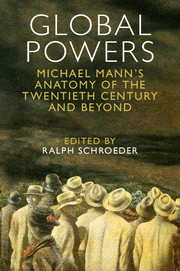Book contents
- Frontmatter
- Contents
- List of contributors
- 1 Introduction
- Part I Theory and history
- Part II Political, economic, military and ideological questions
- Part III American exceptionalism
- 10 Ethnicity, class and the social sources of US exceptionalism
- 11 Mann's big picture of US social citizenship: “Road to World Empire” with Bob Hope
- Part IV Empire
- Part V Response
- Index
- References
11 - Mann's big picture of US social citizenship: “Road to World Empire” with Bob Hope
from Part III - American exceptionalism
Published online by Cambridge University Press: 05 April 2016
- Frontmatter
- Contents
- List of contributors
- 1 Introduction
- Part I Theory and history
- Part II Political, economic, military and ideological questions
- Part III American exceptionalism
- 10 Ethnicity, class and the social sources of US exceptionalism
- 11 Mann's big picture of US social citizenship: “Road to World Empire” with Bob Hope
- Part IV Empire
- Part V Response
- Index
- References
Summary
Most scholars argue that US social policy has been late to develop and smaller in size and influence than that of other rich democracies. This underdevelopment of direct social policy has produced higher poverty rates than those of rich democracies. To explain the distinctiveness of US social policy, some argue that US labor has been comparatively weak, without its own political party, or that US capitalists have been comparatively powerful, dampening the forces for social policy advancement, or that pro-social policy coalitions of labor and farmers never emerged on the US political scene. Others argue that the unusual construction of US political institutions hamstrung potential change. Their extensive fragmentation made it easy for opponents to block social policy measures, and a state that was slow to bureaucratize and democratize also thwarted social policy advocates (see review in Amenta 2003).
Where does Michael Mann stand on these debates about the characteristics of US social policy and what accounts for them? How well do his characterizations of and arguments about the development of social policy in the twentieth century, especially regarding US social policy, work? Mann's volumes do not focus on social policy, but he does write extensively about it and the US case. And his take is of special interest. No expert on social policy has anything like his worldwide comparative and historical perspective, not to mention one that centers on major social changes and power conflicts that range far beyond domestic policy. To answer the first question, Mann largely follows the consensus characterization in the specialty literature, arguing that US social citizenship lagged. Mann argues that US social policy caught up with that of English-speaking and Nordic countries during the 1930s (mainly in Chapters 8 and 9 of Volume 3, as well as in Chapter 3 of Volume 4) and sees social citizenship advancing across the democratic North between the wars and immediately afterward. The United States did not gain as much from the Second World War and postwar periods, however, and fell behind again. From his vantage point, he sees the United States as truly exceptional, however, not in its social policy, but in its race relations.
- Type
- Chapter
- Information
- Global PowersMichael Mann's Anatomy of the Twentieth Century and Beyond, pp. 209 - 226Publisher: Cambridge University PressPrint publication year: 2016



